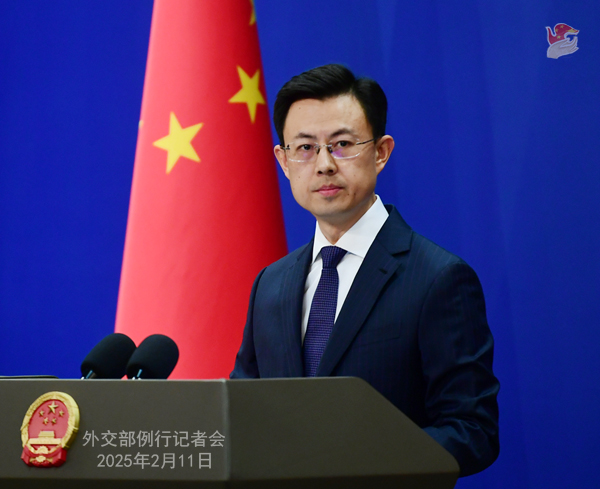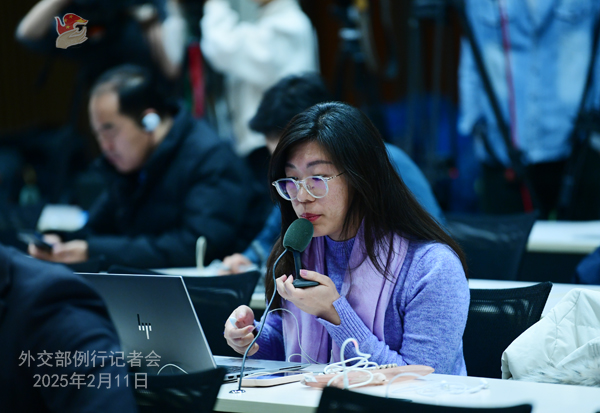
CCTV: We have learned that the 31st China-ASEAN Senior Officials’ Consultation will be held soon. Could you share more information? What’s China’s expectation for this consultation?
Guo Jiakun: As agreed between the two sides, the 31st China-ASEAN Senior Officials’ Consultation will be held from February 12 to 14 in Ningbo, Zhejiang Province. China’s Vice Foreign Minister Sun Weidong will lead the delegation to the consultation and co-chair it with Dato’ Sri Amran Mohamed Zin, ASEAN SOM Leader of Malaysia, country coordinator for ASEAN-China Dialogue Relations and rotating chair of ASEAN for 2025.
The China-ASEAN Senior Officials’ Consultation is an important annual mechanism of dialogue and cooperation between the foreign affairs departments of China and ASEAN countries. We hope that this consultation will be a good opportunity for the two sides to implement the important common understandings reached at the China-ASEAN Summit, have in-depth discussions on the East Asian cooperation under new circumstances and exchange views on regional and international issues of common interest to advance the China-ASEAN comprehensive strategic partnership.
Nikkei: According to the information on the website of Japan Coast Guard, the buoy installed in waters to the northeast of Taiwan has disappeared. The Japanese government believed that it’s because China removed the buoy. Is this judgment of the Japanese government consistent with the actual situation? If this is true, would you please explain the reason and purpose for China to do so?
Guo Jiakun: China’s installation of hydrometeorological buoy in relevant waters is consistent with both domestic and international laws. The buoy has completed its task at the site. According to the actual need of science observation, relevant Chinese agencies have implemented voluntary and technical adjustment regarding the buoy.
China News Service: Yesterday the Munich Security Conference released a report on multipolarization, which noted that we find ourselves at the dawn of an increasingly multipolar era, and China is the world’s most prominent advocate of a new multipolar order and upholds an equal and orderly multipolar world. The report also highlighted that the Chinese people widely believe that multipolarization can bring about peace and prosperity. What’s your comment?
Guo Jiakun: We noted the report. According to the survey conducted by the Munich Security Conference, internationally, more and more people see the world as becoming multipolar. We believe that multipolarization is the underlying trend of today’s world and an unstoppable trend of our times.
China stands for an equal and orderly multipolar world and a universally-beneficial and inclusive economic globalization. We are committed to practicing true multilateralism, work for greater democracy in international relations and call for countries around the world to jointly safeguard the purposes and principles of the U.N. Charter, uphold fairness and justice, and play a constructive role in resolving international and regional hotspot issues. China upholds win-win cooperation. As it firmly boosts its high-quality development, China continues to advance high-level opening-up, promote liberalization and facilitation of trade and investment, and keep the global industrial and supply chains stable and smooth. In recent years, China has been the largest driving force for global economic growth with its contribution to it at around 30 percent over the years.
The world today is confronted with multiple challenges. It is all the more important for countries around the world to have closer cooperation. China is ready to work with all parties to follow the trend of the times, share opportunities, overcome challenges and promote development together, build a community with a shared future for mankind and make greater contributions to safeguarding and promoting world peace, stability, development and prosperity.

Reuters: President Trump said he has spoken to Chinese leader since taking office. Could we confirm that both presidents have spoken to each other? When was the phone call or video call made and what was the discussion about?
Guo Jiakun: President Xi Jinping took a phone call from U.S. President Donald Trump on January 17. There is a public readout on that call.
AFP: According to media reports, the Cook Islands’ prime minister is currently in China for a visit. Is that true? And if it’s true, can you provide some details about his visit?
Guo Jiakun: I answered that question yesterday. I would like to reiterate that the Cook Islands is an important partner of China in the South Pacific. Since establishing diplomatic relations in 1997, our two countries have respected each other, treated each other as equals, and sought common development, achieving fruitful outcomes in exchanges and cooperation in various areas. China stands ready to work with the Cook Islands for new progress in bilateral relations. With regard to your question, we will release information in due course.
Reuters: What details can the Ministry release about the comprehensive strategic partnership deal that China and the Cook Islands are due to sign this week as reported by New Zealand media? What is China’s reaction to concern and opposition among Western allies about China and the Cook Islands signing this partnership deal?
Guo Jiakun: As I have just answered, we will release information in due course. Let me stress that the relationship and cooperation between China and the Cook Islands and other Pacific Island countries do not target any third party, and should not be disrupted or restrained by any third party.
AFP: According to the requirements of the United Nations Framework Convention on Climate Change, countries need to submit their Nationally Determined Contributions (NDCs) by February 2025, but almost all countries, including China, have failed to submit their NDCs on time. So when will China submit its NDCs?
Guo Jiakun: I answered the question yesterday. Let me stress again that China is a doer in climate response and is committed to honoring its pledged goals on carbon peak and carbon neutrality in our own way and at our own speed. China is now working to set the new NDCs in accordance with the Paris Agreement and the requirements of the first global stocktake. We will work actively and responsibly on this task, make our decision on the basis of our national circumstances, capability and stage of development, and inform the UNFCCC secretariat of China’s 2035 NDCs this year in due course.
